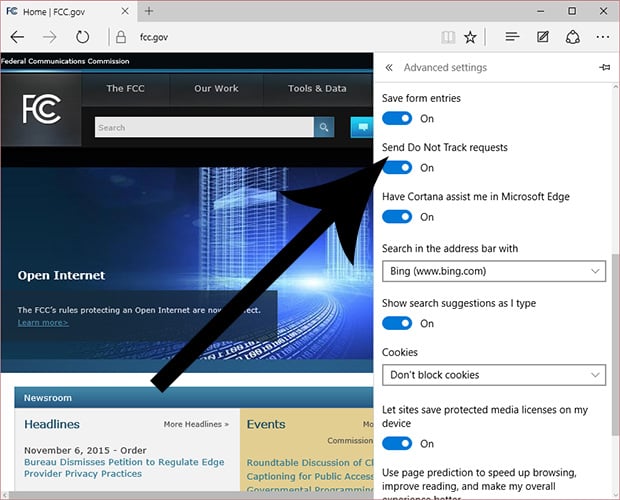FCC Won’t Require Websites To Honor 'Do Not Track' Requests
Have you ever felt like you're being followed? Excuse us for feeding into your paranoia, but you are being tracked. It happens each and every time you surf the web, and it's going to keep happening, even if you've enabled that feel-good "Do Not Track" setting in your browser that most websites and online services ignore.
They ignore it because they can, and the Federal Communications Commission isn't stepping in to help. Consumer Watchdog just tried forcing the FCC's hand by petitioning the government agency to "initiate a rulemaking proceeding requiring 'edge providers (like Google, Facebook, YouTube, Pandora, Netflix, and LinkedIn) to honor 'Do Not Track' requests from consumers," but the attempt failed.

Many websites and services flat out ignore your browser's Do Not Track setting
The FCC's response was that it has "no intent to regulate edge providers." Zip. Zero. Zilch. None whatsoever. You get the idea. To be fair, the FCC's soothing mantra when reclassifying broadband Internet as a utility was that it wasn't going to regulate the Internet, it only wanted to ensure that net neutrality would win the day. And it did.
Whether or not the FCC even has the authority to force edge providers to honor DNT requests is another matter entirely, and one the FCC didn't bring up in its response. The agency did, however, mention that it's implementing privacy rules that apply to Internet service providers (ISPs).
"The Commission has adopted rules implementing section 222’s privacy protections with respect to providers of voice services, has amended those rules over time to respond to emerging threats to consumer privacy, and has vigorously enforced those rules," the FCC stated.
What this ultimately means is that the FCC is ready to step in if ISPs overstep their bounds in regards to user privacy, but for websites and web services, the DNT thing isn't happening -- they can continue to ignore those requests if they see fit.
They ignore it because they can, and the Federal Communications Commission isn't stepping in to help. Consumer Watchdog just tried forcing the FCC's hand by petitioning the government agency to "initiate a rulemaking proceeding requiring 'edge providers (like Google, Facebook, YouTube, Pandora, Netflix, and LinkedIn) to honor 'Do Not Track' requests from consumers," but the attempt failed.

Many websites and services flat out ignore your browser's Do Not Track setting
The FCC's response was that it has "no intent to regulate edge providers." Zip. Zero. Zilch. None whatsoever. You get the idea. To be fair, the FCC's soothing mantra when reclassifying broadband Internet as a utility was that it wasn't going to regulate the Internet, it only wanted to ensure that net neutrality would win the day. And it did.
Whether or not the FCC even has the authority to force edge providers to honor DNT requests is another matter entirely, and one the FCC didn't bring up in its response. The agency did, however, mention that it's implementing privacy rules that apply to Internet service providers (ISPs).
"The Commission has adopted rules implementing section 222’s privacy protections with respect to providers of voice services, has amended those rules over time to respond to emerging threats to consumer privacy, and has vigorously enforced those rules," the FCC stated.
What this ultimately means is that the FCC is ready to step in if ISPs overstep their bounds in regards to user privacy, but for websites and web services, the DNT thing isn't happening -- they can continue to ignore those requests if they see fit.

